Seven pillars of relocating
Seven pillars of relocating give the prospective retiree all the basic information needed to make an informed decision of where and how to move to Panama.
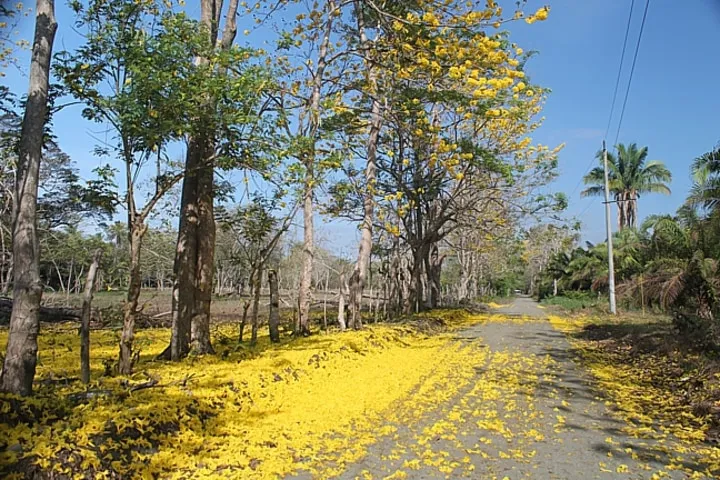
Seven pillars of relocating give the prospective retiree all the basic information needed to make an informed decision of where and how to move to Panama.

1/. WHERE TO LIVE? Palm fringed beach, eternal spring mountain or vibrant city. Every area has something special and redeeming but no area has it all. Find out how to get the best of all worlds.
2/. BUY OR RENT FIRST? The only way you can truly know what a place is like is when you have lived there for a year – through all it’s changing seasons. We offer you the single best piece of advice we can – and explain why?
3/. FILL A CONTAINER OR SELL EVERYTHING? We have moved countries twice. The first time we used a 40-foot container which had an SUV, household goods and 40 used computers inside. The second time We rented a truck – find out what was the easiest.
4/. BUILD BRAND NEW OR REFURBISH? Fixing up can be fun and less expensive however, building new gives you exactly what you want. Find out how husband and wife teams can build their own dream home using new materials and techniques.
5/. INCOME ASSISTING BUSINESS? what will the law allow. There are many unexplored opportunities in Panama. We will show some profitable and as yet untapped income sources.
6/. MEDICAL INSURANCE? There are low-cost local medical insurances available but what may surprise you is the first world hospital care that is available in Panama.
7/. CULTURE SHOCK? It will come and when you least expect it. How to deal with the anguish and upset that a third world reality-check can bring.
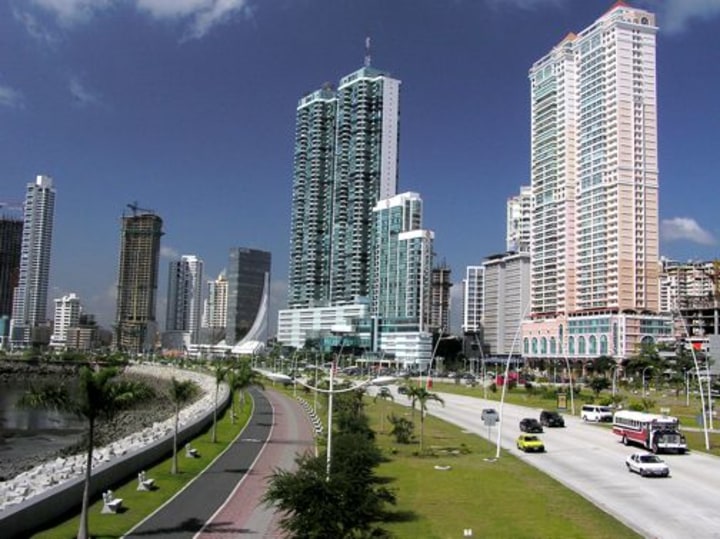
Panama is an ideal place to retire. It has cool mountains, vibrant cities and lush tropical beaches. – The truly ideal situation would be to have a home in all three areas; most of us don’t have that kind of money, but can we have it all, or do we have to settle for just one location.
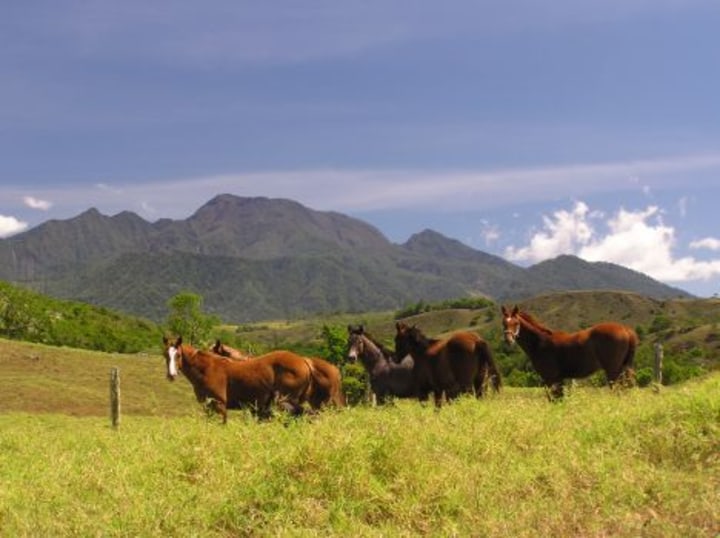
That’s a problem that my wife and I have right at the moment. We live in the mountain community of Volcan where we enjoy “eternal spring” for most of the year. I love the climate, it reminds me of an English summer’s day. My wife however likes the heat and the sun near the ocean. ( I discover this after 27 years of marriage). We can’t afford more than one home, so what do we do.
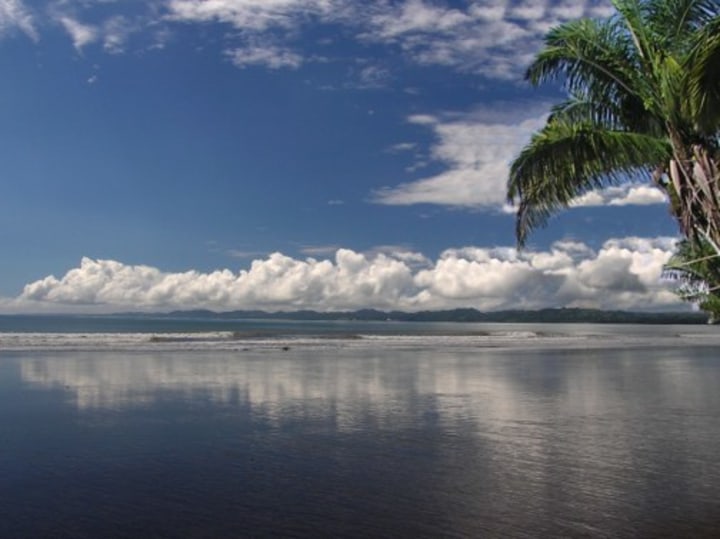 Above the beach near the port city of PUERTO ARMUELLES.
Above the beach near the port city of PUERTO ARMUELLES.
Variety is the spice of life Wherever you choose to live in Panama you can spend a weekend in a completely different climate and then return to you original choice of location refreshed and happy. What I am not going to say in this article is where I think you should live. That’s a decision you have to make.
You can have it all In Panama. It really doesn’t matter where you choose to make your main home. Within hours you can be relaxing on a sunny palm fringed beach, walking along a trail in the high cool mountains or dining at one of the city’s best restaurants. Obviously your choice of “main home” is where you would like to spend the majority of your time. But my wife and I have found that just a few days in Panama or DAVID City with its great shopping and wonderfully diversified dining, keeps us happy for months.
Making that crucial main choice is difficult. I thought we had done that - my wife however would disagree. The compromise we have made is to take small trips to various different places. They are not too expensive and we see more of the country and its people. My advice, see as much of the country as you can before you buy.
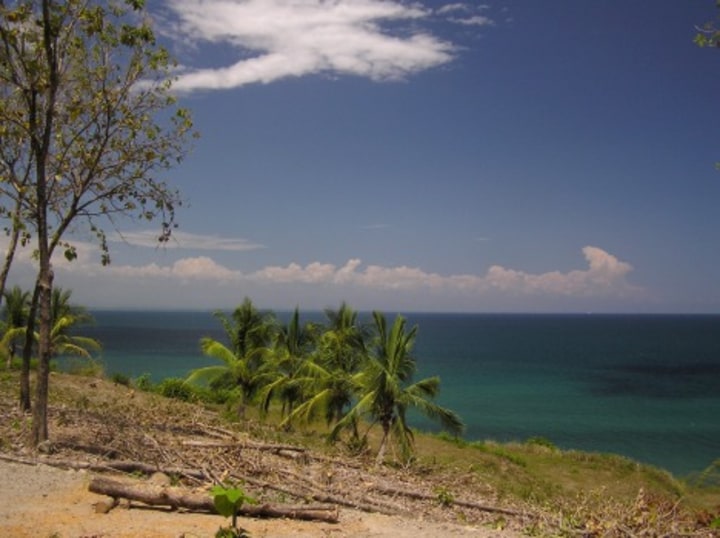
Beaches are wonderful, but on most tropical beaches there is a problem with “sand fleas.” These nasty little things bite the living daylights out of you. This seems to happen just after dawn and just before sunset. The tourist books generally omit this little problem. You can spray for it – it works for a while, but then they come back. Even so sitting on tropical beach, watching the sunset, glass of wine in hand and a soft breeze blowing through the palm trees is one of life’s ultimate experiences.
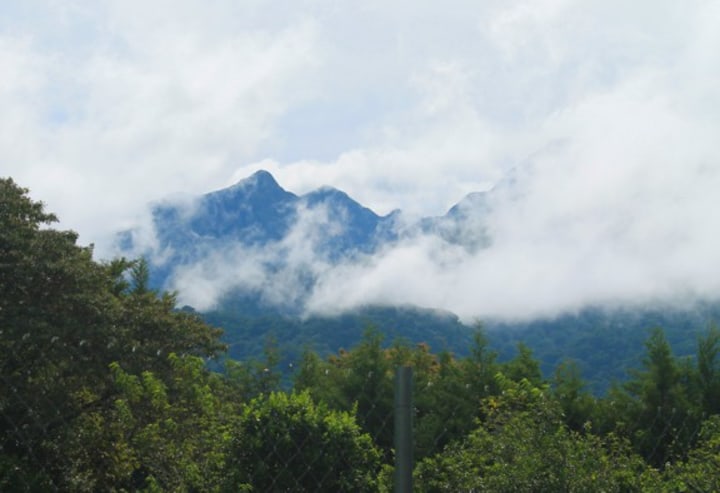
I never fail to be in awe when looking up at the Baru Volcano. It dominates the mountain communities of Volcan and Boquete. It’s just a little short of 12,000 feet and with clouds swirling over and around; it presents a spectacular and constantly changing sight. Those same wonderful clouds bring rain – sometimes lots of it. October and November are the worst. If you came to the mountains in these months you might just turn right around and go home – don’t, it all changes in December, then the dry and windy season starts. Within a few weeks the wet and miserable months fade into memory.
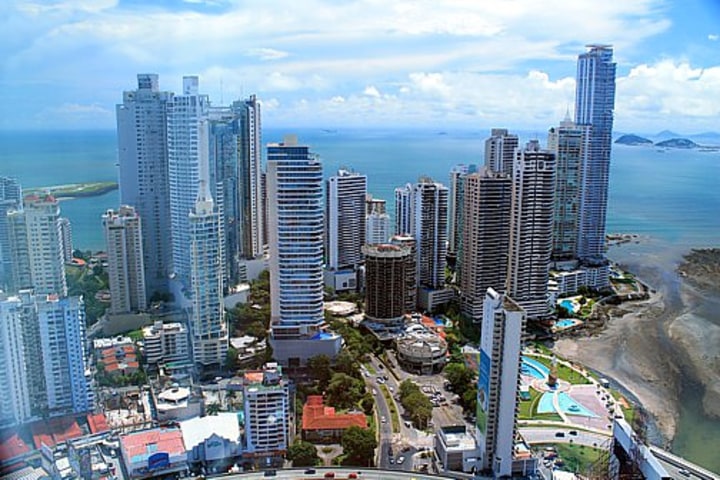
Panama City, is the most unexpected city on earth. Most arriving tourists are completely overwhelmed by the site of so many high-rise buildings. The shopping and great nightlife quickly make them realize that Panama City is “third world” in name only. Apartments with spectacular views can be bought for under $95,000. The only problem is that the city can become very hot and humid. The traffic noise can be deafening at times and driving through the city during rush hour is an experience that leaves some people partially traumatized.
I have deliberately giving you some negatives here, but that’s for a good reason. Most travel writers try to say that everything is beautiful – the sky is always blue, the sun always shines – it doesn’t. If you want advice on where to live, my advice is see all you possibly can then decide. Spend at least 2 nights in each location and try and walk the streets, driving around in an air-conditioned taxi gives you a false sense of reality. Walk as much as you can, That’s the only way you will get a “real feel” of each location.
Don’t worry if you make a mistake on your first choice. Remember, Panama has a change of pace and climate just hours away.
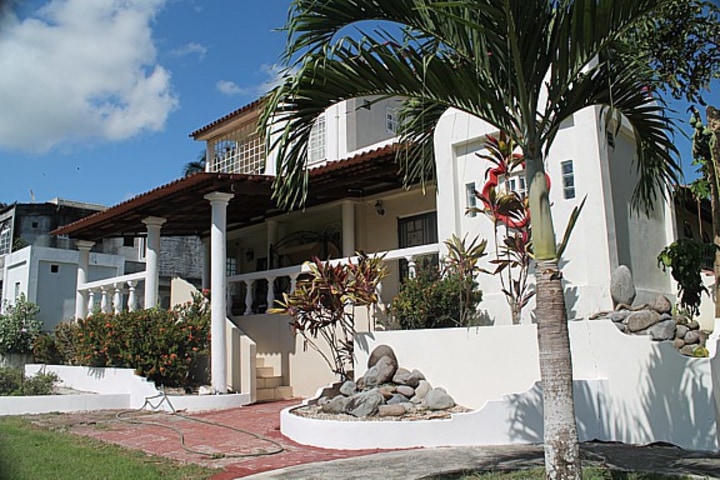
Before you go madly through the real estate listings looking for a home, ask yourself these two questions, “Do we really know where we want to live?”
The second question is, “Are we buying as an end user or are we buying for investment?”
To simplify why you should rent first before buying is that if you find you are unhappy with your choice of location, then if you are renting - you are out-of-there. If on the other hand you buy - it could take two to five years to sell your new home. That is many years living in a place that you are not happy with - or worse – a place you absolutely hate.
Rose-tinted tourist sunglasses. Most of us when we buy a house generally do so with a great deal of emotion. We fall in love with it and the small faults or shortcomings are glossed over by our enthusiasm and our rose-tinted tourist sunglasses.
As you buy, think how you will sell? Many years ago I learnt the crucial lesson, that when you are looking to buy a house you should also be looking at how you are going to sell it. Ask yourself the question, “If I buy this today – could I sell it easily tomorrow?”
How many of us when buying a house actually spent a night sleeping there before we bought? When buying in the tropics with its non-existent noise laws, spending a day and night in a house before buying is a good reason. Here’s a true story from Panama. A man bought a small house on the water’s edge in Bocas del Toro. In the day time with the sun shining the location was idyllic – nighttime was a different scene altogether. Next to his ideal house he failed to fully grasp the importance of the small, innocuous looking, tropical bar. The bar’s mind-numbing disco music started early in the evening and didn’t stop until four o’clock the next morning.
Most of us have some idea of where we would like to live – for most of us it’s a mental image of a white sand beach, palms swaying and almost kissing the clear blue ocean waves as they rush to shore.
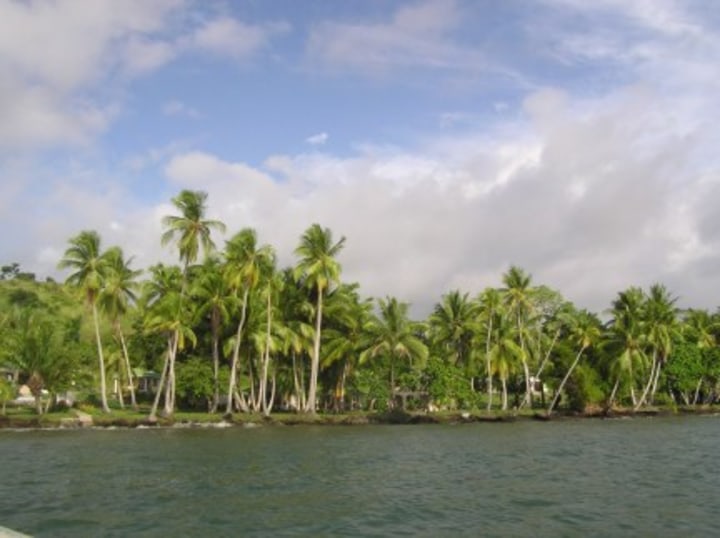
Another true story. A few years ago I was filming on the Pearl Quays of Nicaragua. Let me preface this by saying these islands are an advertisers dream – white sand beach, azure blue waters, coconut palms – the works. A group of us were dropped off on one island were we had lunch and explored and snorkeled for two hours before the boat came back to pick us up.
There was a Californian dentist in our group called Mickey. At first he seemed excited as we landed on this deserted stretch of paradise. Two hours later I saw him sitting dejected on the beach with his head in his hands. “What’s the problem,” I asked. He gazed sadly out across the pristine clear waters and said that all his life he had fantasized about being on a desert island such as this. Now after two hours he couldn’t wait to get off. The cruel hand of reality had destroyed another dream.
The Panamanian tourist board may hate me for saying this but Panama is not paradise. Sometimes the heat and humidity can be oppressive and in the mountains it can rain a lot. Let me clarify the previous statement by saying that in my sixty years of traveling this globe I haven’t found paradise – even benchmark Hawaii has its downside. I will say for the record that as a retirement destination Panama is the best place in the world to retire – bar none!
Explore fully, then buy. My last piece of advice would be for potential retirees to come to Panama and spend at least a month touring the country. Spend a week in Panama City, go shopping and try as many of the great restaurants as you can. Travel to Bocas del Torro and walk the beaches.
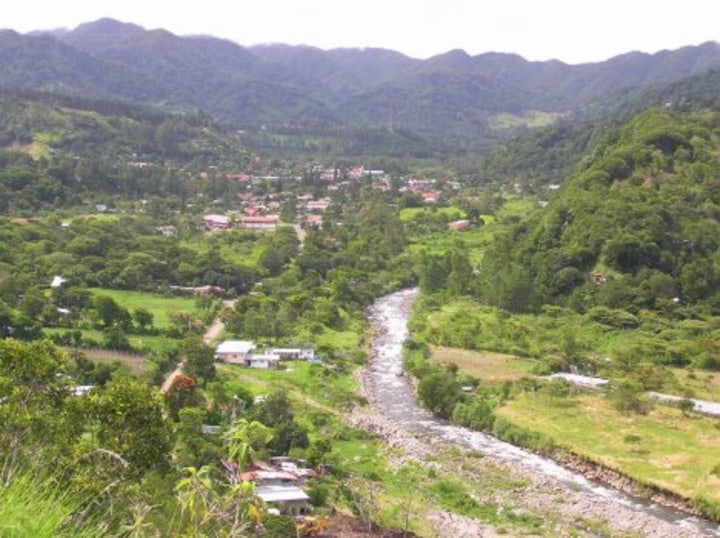
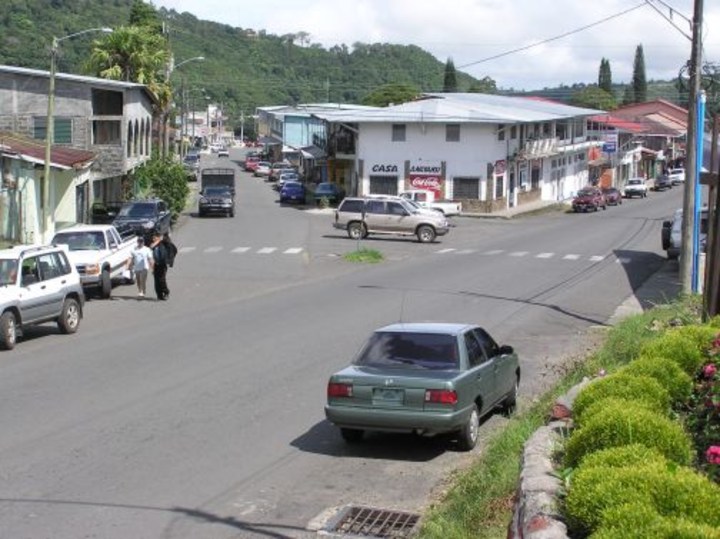
Spend at least a few nights in Boquete, the town will charm you and if the prices don’t scare you that might be your future home. If a drier beach life is for you definitely check out Chitre and the Azuero peninsular. I feel it is Panama’s best-kept secret. Then come and see Volcan. True not the prettiest town but travel up the Alpine valleys to Cerro Punta. Look down on the clouds below. Breathe in the freshest air your lungs have had in ages and then after all this decide where your heart wants to be.
Let your heart guide you to your new home, trust me the furniture and other stuff will follow along later.
Relocating from Canada to a Central American country we hired a leading Canadian moving company. They were a large outfit with many years of reliable service, so we felt we were in good hands. The salesman faithfully promised us that this was indeed door-to-door service. It wasn’t. In fact it wasn’t even country-to-country service.
In a strange country and being unable to speak the language it was a major struggle to find a broker who could arrange to transport the container and have it unloaded at a bonded warehouse. That’s another thing the salesman forgot to tell us. When the container arrives at the customs shed there could be a charge of $50 per day if you leave the goods in the container. So the goods are unloaded and stacked in the middle of a dusty warehouse.
FINALLY IT ARRIVED. Four months later, our relocation complete, the household goods and vehicle finally arrived at our doorstep. This is the first problem with movers; for the most part they are not truly international. They may operate from the US or Canada but then they rely on a broker in the receiving country to complete the deal.
I have heard horror stories of goods being damaged, stolen and in one case an entire container disappeared. If you must ship by container then try and arrange for the handling of your goods to be controlled by a shipping agent in your destination country.
Some things they say don’t travel well. I heard of someone who had not one, but two grand pianos shipped. The tropics are not kind to antiques and fine furniture. Case in point was a hotel in Granada, Nicaragua. They had a beautiful, 100 year old, Steinway grand piano shipped from New York. The case was beautiful but the soundboard suffered terribly from the excesses of both extreme dry heat and alternating high humidity. Even expert tuning couldn’t help. I remember attending a concert one night when Cuba’s leading pianist gave a recital. The performance was-excruciating to say the least and the poor Cuban was most probably waiting for Castro to enter the room and shoot him.
The cost of shipping a container can run from about $4,000 all the way up $20,000 depending on size etc. The simplest and most sensible thing to do is to sell off all your old furniture and buy new in Panama. Or you could put you valued antiques into storage until you are absolutely sure Panama is going to be your new home.
When my wife and I moved from Nicaragua to Panama we hired a local shipping company. They came to the house and professionally labeled and listed all of our household items – we didn’t ship any furniture – we sold it all or donated it. The same bonded truck arrived at the customs warehouse in David a few days later. The seals were broken and the contents seemed intact. The older, women inspector glanced inside and spotted my guitar case. I immediately opened the case to show there was nothing contraband inside and she indicated she wanted me to play something. My party piece is the Beatle’s “Yesterday” and though I say so myself, I do a very good rendition of Paul McCartney’s classic. The moist eyed inspector waved the doors of the truck shut and within an hour the entire contents were unloaded at my new home in Volcan-nothing missing and nothing broken.
If you really feel you have to bring all your things with you – a small piece of advice. Try to put everything inside large, strong, plastic containers. Or better still have custom-made wooden crates made. It makes moving easy and keeps moisture, dust and prying hands out of your stuff. A NEW LIFE -SO WHY NOT START ANEW? Try to think of your new life as a new beginning. If you do it well it can take years off you. You can almost feel like a child again. Lets face it your TV and computers are most probably all out of date, so why not shop for something new. Please don’t start off your new life with bitching emails between you and your moving company. Trust me you do not need the hassles.
I will give it to you straight and honest, if you want to build a new dream home or fix-up an old one into the Shangri-La of your dreams – be prepared for headaches, heartaches, sleepless nights and a few other problems.
My wife and I have built or fixed up six houses in Latin America. I was just about to start on my biggest project yet – an English style pub here in Volcan – but dear wife sat me down one night and after removing the rose tinted glass from both my eyes and my memory the cold light of reality set in. I realized that half a year or more of stress and frustration were just not worth it.
Disappearing money, disappearing contractors If you decide to embark on a building or refurbishing project in the third world, you can count on six to eight months of six day a week, intense worker supervision. The biggest single mistake people make – and I have seen this so many times – absentee owners hand over control and large sums of money to a local contractor. When they do return to check on the progress of the construction they find, to their amazement that very little has been done and the wonderful, friendly contractor-if he hasn’t disappeared altogether is asking for more money than was originally agreed upon.
Everything, repeat everything, in writing. I have a contract that a friend drew up that you can use as a template for any work you might undertake. It covers just about everything including that “Devil in the details” the ubiquitous and almost unavoidable, “additions and changes.” Something else I have seen many times, times. The owner argues with the contractor and the contractor says, “Yes, I know we agreed on the price, but you have made additions and changes.” Make sure your contract has iron-clad clauses to cover this “excuse.”
Fixing-up old homes can be fun, I am told. It certainly looks that way on those afternoon, do-it-yourself TV shows. The reality is that it is a royal pain in the rear. The dust, debris and despair at finding walls out of plumb, floors running up hill, electrical and plumbing looking like they were designed by some cruel comedian. This generally results in one or other spouse angrily shouting, ”why the heck didn’t we just knock it all down and start from scratch?”
The costs of building versus refurbishing In Panama you can buy a brand new Panamanian style home for under $20,000. Refurbishing an existing home can cost you from $10,000 to $35,000. Building an upscale North American style home can cost from $80,000 upwards. The cost for building in the Chiriqui area is in the range of $45 a square foot.
The biggest variable is the finishing touches. Whether you have a 2,000 square foot mansion or a 2,000 square foot modest home, To the point of lock-up - the basic construction costs are the same. The difference comes in appliances, tiling and more especially the kitchen. Custom made cabinets for example can cost from under $1,000 to over $10,000. I have even seen a kitchen costing over $40,000.
The sad realities of third world construction I love the Panamanian people; they are warm, kind and generous but their standards of construction leave one far from ecstatic. Example number one would be asking them to build walls straight and level and plumb. Walk around any construction site here and you will see what I mean. The walls are out of plumb, there is hardly any cement in the joints and the levels look like a roller coaster engineer designed them.
In block construction they seem to have an almost averse fear of putting cement between the ends of the blocks. The resulting “dry” joints are covered over with a cement screed called repello (pronounced reh-pay-oh) This cement mortar hides a multitude of sins but more importantly it hides a potentially fatal flaw that an earthquake might uncover.
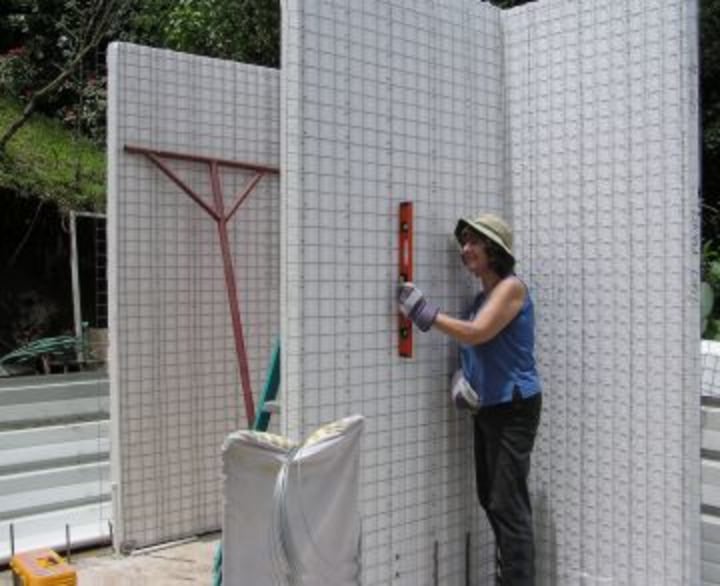
Recently we finished the extension to our home in Volcan. The walls and roof of our new bedroom were made out of a product called Covintec or M2. Basically it is a sheet of foam with vertical and horizontal wire bracing running through it. You pour a concrete foundation and leave short pieces of re-inforcing bar protruding, then you simply slot the M2 into these bars. My wife(who has zero experience in construction) and I erected almost the entire walls of our new bedroom within one day.
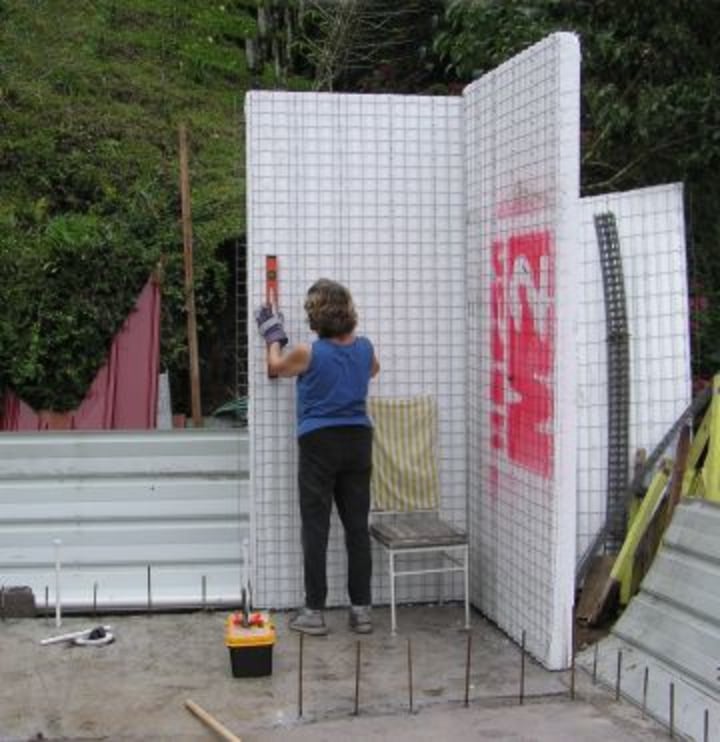
Covintec or M2 is more expensive than block but way, way faster. After assembling the walls, my workers sprayed cement repello onto them and that gave us the finished surface. Before the cement gets sprayed, it’s a real doddle to use a gas torch and burn the grooves for both the electrical and plumbing fixtures. These foam and reinforced wire sheets come in different thickness – my advice is to use nothing less than four inches thick. Thinner sheets have a tendency to buckle and are not load bearing.
Wait there’s more There is an even faster way yet. First build the skeleton of the house in “post and beam” style, out of vertical four inch steel beams and roof trusses out of “cariola” steel beams. Then the curtain walling can be done with the Covintec or M2. This method has become very popular here. This method has many advantages – the first is that you can have the roof on first and then you can work on the walls and interior protected from rain.
If you do decide to move to either Volcan or Boquete, come and visit me at Casa Volcan, I am willing to give you free advice and to show you some video of how this product is used.
My final advice is to consider all the cost ratios involved. Not just between building new or fixing-up but something more important – the stress factor. If you think you or your spouse might end up attacking either, each other or the workers with power tools then careful consideration should be given to living in an apartment or finished house.
Before you even think about a small business consider this: Are you coming to Panama to retire and relax? Think very carefully of what you are going to do. This will not be all fun – it will have heartaches, headaches and at times you will wish you hadn’t even bothered.
My wife and I have had several small business ventures in the third world and we have some sage advice. Here is a short and well considered shortlist.
Try something in which you already have experience. Most new businesses fail within the first six months. Can you afford the cost of failure in a new venture?
Start as small as is economically viable. Don’t expect get rich quick-it practically never happens. Stress will kill you almost as quick as being hit by a bus.
Plan well in advance of starting. Ask others in the business what the problems are – be pessimistic rather than optimistic in your targets.
Who will be your target market? There are over three million Panamanians and only a handful of gringo’s. The profit margins here will not be as big as in North America.
My cardinal rule! Do something you are going to enjoy- not something simply to make money. Haven’t you had enough worries in your life already?
What the law allows There are some fairly strict laws on what you can and cannot do in Panama. For instance you cannot work in a retail business. That makes sense- you would be taking a job from a Panamanian. The best advice on this is to get some professional advice from an English-speaking lawyer. Spend at least an hour with your lawyer and write down all the questions beforehand. Don’t forget to ask how much and where? when it comes to paying taxes. It may be wise to form a company, this is also something that you should discuss with your lawyer.
Professional & consulting services This is something that has great possibilities, particularly if you have experience from your working life. I know most people don’t want to spend their retirement years doing the same thing that they did before- and might have hated. But the good thing about being retired is that you don’t have to do it eight hours a day, seven days a week- you do it when you want to and only as often as you want to.
Start a website As long as you don’t start up in competition with me, believe me there are a hundred and one other possibilities out there. Websites are not that difficult to do (Hey! I am doing it). Think about all the exciting things you would like to do. Some ideas are: bird watching, travel writing, poems, short stories, and cooking tips. Particularly if you can put a unique “Panamanian” angle on things. First build the site and then look for advertisers or sponsors- that’s how you make your money. For the right price I might even consider selling YourPanama (you see how easy it is).
Free advice I may regret this - but I am willing to give some free tips to people on how to start up a website. There is a very good Canadian company called Site-Sell, that makes setting up a website very easy. (I am using it right now).
Bed & breakfast The rule is that you need to have three bedrooms to run an approved B&B. The tourism ministry will come and check that everything is in order and issue you a license. You will have to charge a 10% room tax for your visitors and if you serve them a meal there is an additional 5% tax. B&B’s are most probably the easiest form of income assisting business as in most cases you already own a home and have spare bedrooms.
A restaurant Restaurants are really only for the experienced. Over the years I have met dozens of people who have thought they could do a better job than anyone else at running a restaurant. All too often I was witness to the sad conclusion of these ventures when, within a year, the restaurant closed and in some cases, sadly, these people lost their home as well. Important point, you will need to have a Panamanian as the titular owner of the restaurant. Again check with your lawyer before signing.
The golden rule of business An old, but well established business rule is: ”find a need and then fill it.” Looking around Panama I have seen many such opportunities, the best I think is in the ceramic or pottery business. I had a friend who exported pottery from Nicaragua. He started small in his pottery exporting business, but eventually built it up to the point where he regularly shipped a fully loaded container. With an almost 200% mark up this was a very viable and profitable business.
La Arena, the pottery capital of Panama. I did an article last year on Arena the pottery town near Chitre. This small, clay-rich area has over 40 small pottery and ceramic makers in the town. From my interview with one potter I learned that virtually nothing gets exported. The quality and low cost of these hand-made pots is equal to anything I have seen in either Mexico or Nicaragua.
National dress costumes Another item that I feel is ripe for export is the national costumes of Panama. We all know how successful the sales have been of the Mexican shawl, the “serape.” Panama’s pollera and enagua’s are just great decorating ideas that the world has yet to discover.
In conclusion you should look at these ideas as “income assisting” businesses – they shouldn’t be your main income. Your main business should be, playing golf, going for drives in the country, trying out new restaurants and enjoying a stress free retirement.
For Priscilla McLeod This is a link to our medical coverage page. Priscilla McLeod Sosa has been a correspondant for us for ten years. She is based in Panama City but can provide coverage for any part of Panama.
One of the leading questions I get asked from potential retirees is, “What do you do for medical coverage?” The second question is almost always about the standard of Panamanian medical care. As a reporter and videographer I have traveled extensively throughout Latin America and found Panama’s medical care to be the best anywhere in the region.
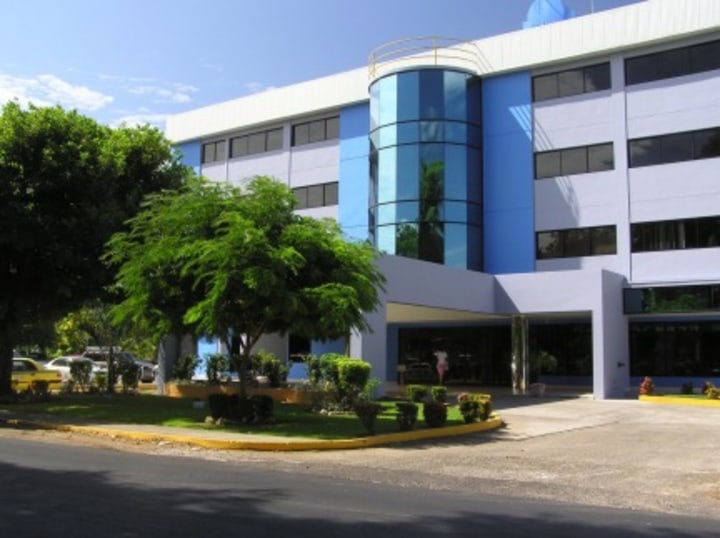
On our auto insurance we have a small amount for emergency treatment after car accidents, but we felt we needed more. A friend had signed up for a policy with Chiriqui Hospital, David’s leader in private medical care. He spoke in glowing terms of the doctors and the equipment, so we decided to check it out for ourselves.
We were no strangers to the Chiriqui Hospital – it has the best laboratory in the area. Our veterinarian had regularly sent blood samples there from our 15-year old Schnauzer. The first part of signing-up requires an interview with health plan director, Manuel Granados. Fortunately for us linguistically challenged, most of the people at the Chiriqui Hospital speak English.
The cost for both my wife and I is just $180 a month with coverage up to $15,000. In case of an accident, the plan covers 100% of the emergency room costs. If we need immediate medical appointments then the charge is a modest $7.00 a visit. The plan offers coupons for X-rays and lab tests and the plan covers 70% of these costs.
Manuel said the only thing the hospital is not equipped for is long-term cancer care. However Chiriqui hospital has an agreement with a leading hospital in Panama City. I visited that hospital some years ago and was told that it was the leading oncology center in all of Central America.
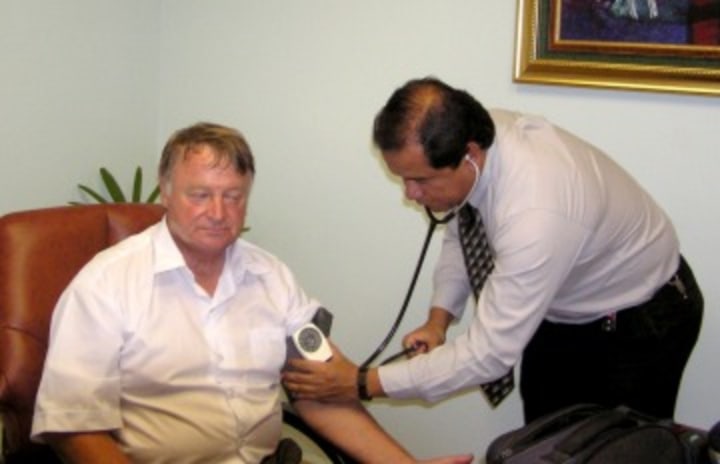
After the form filling Manuel led us downstairs to the laboratory to donate some blood – actually just a vial full. The results he told us would be ready at 2:00 that afternoon. Then I was introduced to Executive Director Rigoberto Martinez. The reporter in me immediately seized the opportunity to get an inside look at the cool gear the hospital is famous for. Rigoberto happily obliged me and soon I was shown the state –of-the art Catscan machine. CT scan’s are now regarded as a basic tool in any hospital. Depending on the extent of the examination, at Chiriqui a scan will cost you about $275 to $600.
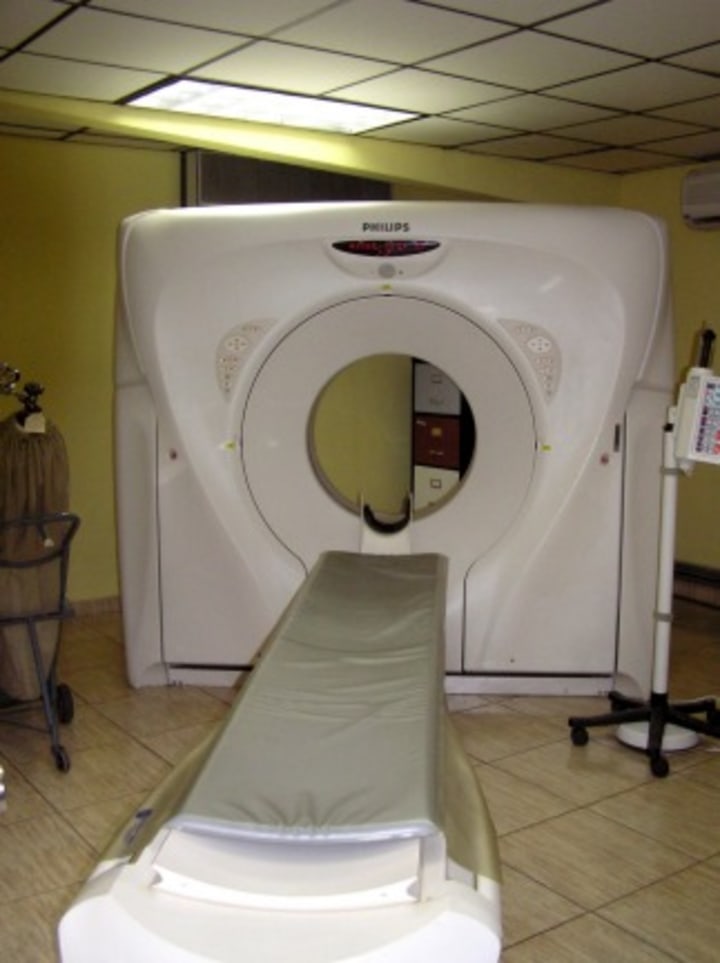
The next wonder tool was the MRI (magnetic resonance imaging) This will cost $600 for a scan, but if you are signed up on their health plan – the cost is cut by 50%. One great touch was the room decor. Manuel explained that some people feel claustrophobic under these machines, so they have painted the walls with a wonderful outdoor fresco. tests. Doctor Julio Osorio – analyzed the results, again, someone who speaks good English. My wife did have a high-level of the low-density cholesterol (LDL) and was prescribed medication to deal with it. As the doctor read down my results I will admit feeling apprehensive. Let’s face it, bad news can come in a doctor’s office, especially from blood tests. He slowly scanned the results and paused at each line. “Prostate … normal.” He said. I did admit to an audible sigh of relief. The statistics for men of my age are gloomy, it seems one out of every four of us will have a prostate issue in his life. Next to heart failure, the prostate is our number one killer. My blood tests were good all-round but the blood pressure cuff wasn’t so obliging. Hoping to fend off any bad news I said. “I am border line high blood pressure,” The good doctor shook his head and pointed to his gauge. “No, you’re not border line, your blood pressure is actually high.”
Chiriqui Hospital has a first-rate emergency medical team. The doctors have been trained in the USA and Europe and are often upgraded on the latest techniques. One positive aspect of the hospital care is their orientation towards service. Everyone from the nurses, secretaries to doctors has that in mind. My greatest commendation for the Chiriqui Hospital is that is doesn’t feel like a hospital at all. It’s light, bright and very friendly.
If you had thought about retiring to Panama, and worries over medical coverage are holding you back, there is no need for concern. The coverage in all of Panama is good. The prices may be third world but let me assure you the medical care – that is truly first world.
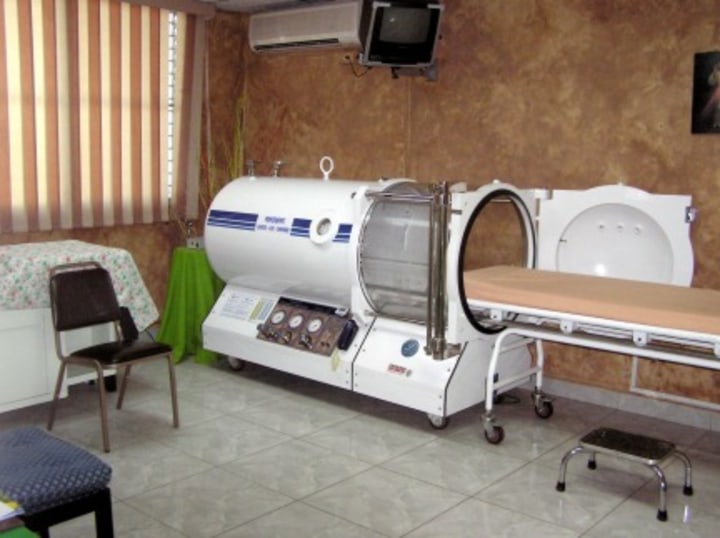
Hyperbaric Oxygen Therapy (HBO) A few doors away are their newest medical devices – a hyperbaric chamber. Although this was primarily designed to combat the “bends” in deep-sea divers, today’s hyperbaric chamber has far wider uses. Hyperbaric Oxygen Therapy has shown 40% to 100% improvement in stroke victims. Brain injury, cerebral palsy, burns, multiple sclerosis, these and many other ailments can be treated with the use of HBO.
At 2:00 we returned for the results of our respective blood.
Culture shock generally comes as something unexpected and very unpleasant. As a tourist you may not experience it – after all your spirits are high and you’re on holiday. It’s when the holiday feeling evaporates and when you have settled down to retire in Panama that’s when it comes.
For most of us that unexpected and unpleasant occasion arrives with a police stop. If you don’t speak and understand Spanish, that’s’ a problem. Remember you are no longer a tourist having a good time you are a retired resident. If something is wrong you are going to have to live with it. Rule number one, never argue with the police. They have the power to make your life hell if they wish.
I have been stopped many times by the police, and yes I will admit at times I was clearly in the wrong. Not every cop is looking for a bribe – surprisingly Panama may have the most honest Police in Latin America. I will not and cannot admit to have paid “expediency” money. Let me say that this is the experience with some of my friends. The officer will say you are speeding and the fine is $100. He may take your licence and you will have to go the city and pay the fine. He might suggest that you can pay “right away” and keep your licence. Paying right-away is negotiable, maybe as little as $5. will have you on your way.
Buyer be very aware. The worst form of culture shock is when you find you have been defrauded in a property deal. Suddenly you become aware that all the legal norms of your home country don’t apply in Panama. You may be up against a crooked lawyer who is in cohoots with a corrupt local politician. This does happen here but fortunately not too often. Accept this fact before you retire here – corruption is a way of life in all of Latin America.
My advice, and this is from someone who has been there and suffered the nightmare – ask around for a good, trustworthy, English speaking lawyer. Get him or her to check your property six ways from Sunday. If you are buying raw land. Get another lawyer to do a check independently from the first lawyer. Make sure your lawyer or their agent talks to all the neighbors SURROUNDING your intended purchase.
If you move to the Chiriqui region of Panama (and we hope you will) we highly recommend our lawyer and friend, Juan Candanedo. His office is in David, Chiriqui. He speaks English and has performed wonderfully for us and many other people over the years. He will give you good advice and will not overcharge you. these are his contact details: JUAN CANDANEDO Abogado/Lawyer. jacm25@cwpanama.net jcandanedo@yahoo.com (507) 775-2971 (507) 775-3975
Panama has a public land registry that can be accessed on line. It shows the name of the owners, and any liens or incumberences. We do NOT recommend buying ROP (Rights of Posession) land. Also as a foreigner you cannot legally buy land within 10 kilometers of the border. The first 22 meters from the high tide mark on any beach is government owned and you cannot build on it. Other laws apply about land close to a river or stream. Always, always check with your lawyer before completing the deal.
Finally let me say that my wife and I have lived happily in Panama for the last 15 years. We have bought two houses and a piece of property and yes there have been some problems. Remember this is their country and their culture. We have no right to expect them to adjust to our ways.
My final advice, and this after living in Central America for nearly 20 years – slow down, chill out and never take life or yourself too seriously.